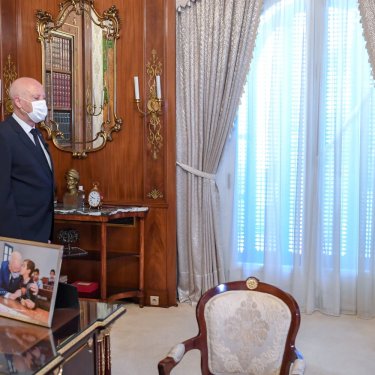Tunisia’s new prime minister asked to prioritise safeguards for press freedom

Reporters Without Borders (RSF) calls on Tunisia’s newly appointed prime minister, Najla Bouden, to implement Tunisia’s undertakings as regard journalistic freedom, independence and pluralism, on the basis of Chapter 2 of Tunisia’s constitution and the country’s international obligations.
Reporters Without Borders (RSF) calls on Tunisia’s newly appointed prime minister, Najla Bouden, to implement Tunisia’s undertakings as regard journalistic freedom, independence and pluralism, on the basis of Chapter 2 of Tunisia’s constitution and the country’s international obligations.
President Kais Saied asked Bouden, a university professor, to form a new government yesterday, two months after declaring a state of exception. Presidential decree No. 117 grants Saied full powers, including the power to issue decrees regulating news and information, the media and publishing.
Various violations of the right to provide news and information have been reported in recent days. The new prime minister must prioritise the implementation of President Saied’s pledge to preserve the achievements of the past decade as regards press freedom and the provision of news and information.
“It is essential for the future of Tunisia’s young democracy for journalists to be able to continue playing their independent watchdog role by informing the public,” said Souhaieb Khayati, the head of RSF’s North Africa bureau. “We ask the prime minister to make press freedom one of the new government’s priorities, and to do everything necessary to ensure, in consultation with journalists’ representatives, the provision of strong safeguards for media independence and pluralism, in accordance with Tunisia’s constitution and international obligations.”
RSF is concerned about several incidents in the past few days, Several journalists were summarily detained by police yesterday, the day the new prime minister was appointed. IFM reporter Faïza Arfaoui was booked for filming without a permit. Lilia Husseini, who works for Radio Nationale, was physically attacked by a policeman who took her to a police station and confiscated her equipment. Oussama Chaouali, an investigative reporter for a TV current affairs programme, was covering the trade in human remains at Jellaz cemetery when he and his crew were arrested and held for more than five hours.
Several journalists were threatened with violence on 26 September by demonstrators protesting against the president’s latest decisions. Khashf Média reporter Khoula Boukrim and photographer Aymen Touihri, Hakaek Online reporter Yosra Chikhaoui, La Presse reporter Salma Ghizeni and Radio Nationale’s Jihen Alouane were told “clear off” and were accused of collaborating with “disgraced media.” Police intervened after hearing the threats.
Tunisia is ranked 73rd out of 180 countries in RSF's 2021 World Press Freedom Index.



